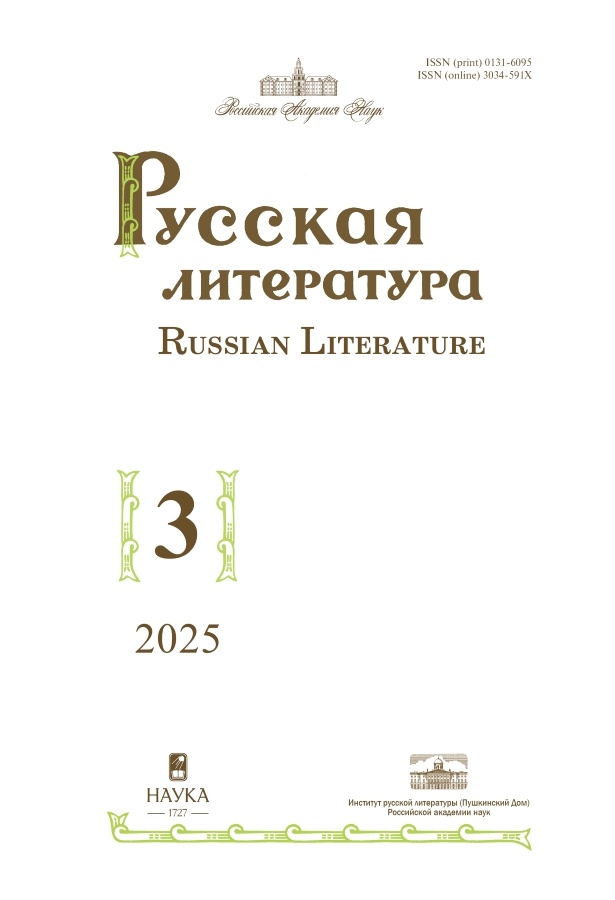Русская литература
Ежеквартальный рецензируемый научный журнал выходит с 1958 г.
Учредители
- Российская академия наук
Издатель
- Российская академия наук
119991, г. Москва, Ленинский пр., 14.
Журнал издается под руководством Отделения историко-филологических наук РАН.
О журнале
«Русская литература» – первое и единственное в стране периодическое издание, посвященное истории отечественной словесности на всех этапах ее развития. Одной из актуальных задач «Русской литературы» является репрезентация современного состояния академического литературоведения, наиболее ярких достижений в отдельных его областях. Этой же цели, наряду с информационной, отвечают публикуемые на страницах издания хроники текущих конференций и рецензии на недавно вышедшие в свет научные монографии и сборники. Издание рассчитано на специалистов по истории русской литературы и адресовано профессиональной аудитории.
Ключевые направления
- фольклор
- древнерусская литература и литература XVIII века
- классическое наследие
- литература новейшего периода (XX век)
- теоретические и историко-литературные исследования
- биографические и текстологические разыскания
- тематические рубрики, посвященные юбилейным датам писателей-классиков, полемике, атрибуциям
- критические обзоры и рецензии
- обширная информация о текущей научной жизни, в том числе хроники международных симпозиумов и конференций.
Индексация
Включен в перечень ВАК
Свидетельство о регистрации СМИ: № 0110194 от 04.02.1993
Текущий выпуск
№ 3 (2025)
Статьи
«Люди незнаемые» в древнерусской литературе
Аннотация
 5-24
5-24


СОЦИАЛЬНЫЕ КООРДИНАТЫ ЛИТЕРАТУРЫ: БИОГРАФИИ, ИНСТИТУТЫ, РЕПУТАЦИИ
О социальной истории русской литературы XIX века. Задачи и перспективы изучения
Аннотация
 25-36
25-36


Редстокизм в периодической печати второй половины 1870-х годов
Аннотация
 37-49
37-49


Поэзия М. С. Шагинян в оценке литературной критики 1900–1920-х годов: социокультурный аспект
Аннотация
 50-63
50-63


ИЗ ИСТОРИИ ЛИТЕРАТУРНЫХ КУРЬЕЗОВ
О плагиате в начале XX века и пародии А. А. Измайлова «Гордик и его сыновья (не из Мицкевича)»
Аннотация
 64-85
64-85


 86-106
86-106


ДРАМАТУРГИЯ ЭПОХИ ПОЗДНЕГО СОЦРЕАЛИЗМА
Композиция пьес А. В. Вампилова: Уход от официальной эстетики?
Аннотация
 107-117
107-117


Сознательность vs. «сознательность»: соцреалистический конфликт в «производственной драме» 1970-х годов
Аннотация
 118-126
118-126


Соцреализм на экспорт: поздний советский театр сквозь призму Вестника ВААП (вторая половина 1970-х — середина 1980-х годов)
Аннотация
 127-141
127-141


Публикации и сообщения
Письма Е. А. Протасовой 1807 года о сватовстве В. А. Жуковского
Аннотация
 142-152
142-152


Промышленная компания Кастелло в Тифлисе (к истории проекта Российской Закавказской компании А. С. Грибоедова и П. Д. Завелейского)
Аннотация
 153-158
153-158


Э. Ренан и его русские знакомства (по рукописным материалам)
Аннотация
 159-162
159-162


«Братья Карамазовы» на французском языке: переводы, антипереводы, перепереводы
Аннотация
 163-171
163-171


К истории так называемого «фуделевского» собрания сочинений К. Н. Леонтьева: протоиерей Иосиф Фудель и Б. А. Грифцов
Аннотация
 172-177
172-177


Стихи М. Л. Моравской о животных в контексте ее писем к М. А. Волошину
Аннотация
 178-181
178-181


Н. Я. и О. Э. Мандельштамы — читатели Е. А. Баратынского
Аннотация
 182-191
182-191


«Что значит быть евреем?..»: Б. Л. Пастернак и «Еврейский вопрос»
Аннотация
 192-203
192-203


Студия китайской поэзии издательства «Всемирная литература»: В. М. Алексеев и Н. С. Гумилев
Аннотация
 204-219
204-219


Русские персонажи и реалии у Висенте Бласко Ибаньеса
Аннотация
 220-224
220-224


Врачи в окружении Даниила Хармса: из комментариев к его записным книжкам
Аннотация
 225-238
225-238


О проекте информационно-поисковой системы по рукописям А. С. Пушкина
Аннотация
 239-251
239-251


Обзоры и рецензии
 252-255
252-255


 256-257
256-257


Литературная генеалогия В. В. Набокова в исследованиях 2014–2024 годов
Аннотация
 258-265
258-265


Хроника
Научный семинар отдела по изучению русской литературы XVIII века в 2023–2024 годах
 266-270
266-270


Международная научная конференция «Русские классики второй половины XIX века: биографические и литературные „пересечения“, критическая рецепция и интертекстуальные связи»
 270-274
270-274


Пятые международные набоковские чтения
 274-278
274-278


XLIII Некрасовская конференция
 278-280
278-280















